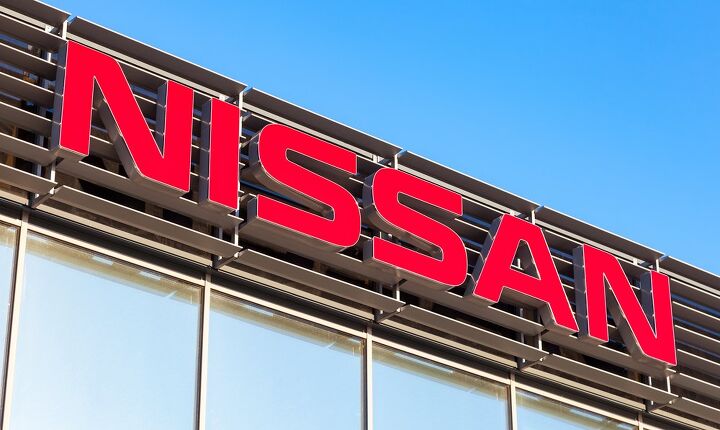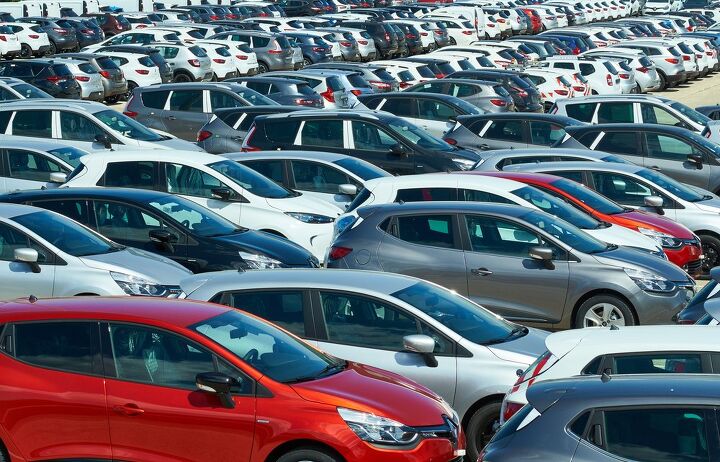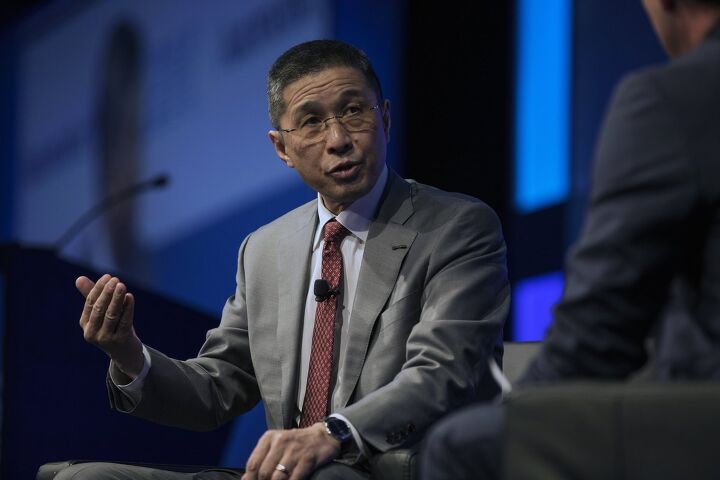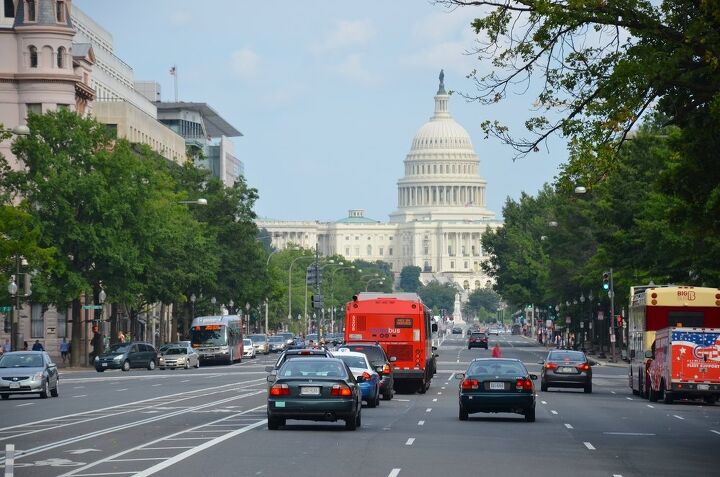#AutomotiveIndustry
The Most 'American Made' Automobiles You Can Buy in 2019
While they’re typically a little older than the first time car buyers that usually approach me for advice, there is a subset of individuals that tell me they want to ensure their vehicle is American Made™ and supports the hard working men from country they love. Unfortunately, this usually occurs at the tail of our conversation. We’ve got a price in mind, narrowed down the segment, and are now circling a handful of models they might actually be happy owning. Then they hit me with the regional curveball.
It’s not easy deciding what qualifies as truly American. Sure, I could just rattle off a list of vehicles built inside the United States — and am sometimes forced to — but that doesn’t take into account the multitude of components comprising each model. Such a task would be a monumental undertaking and these discussions usually take place at a drinking establishment, where I’m inclined to get drunk distracted.
Fortunately, Cars.com does an annual rundown of the “most-American” vehicles currently in production with its American-Made Index (AMI) — leaving few stones unturned in its year-long quest for answers.
Nissan Reforms Pass, Saikawa Reappointed as CEO
Nissan’s planned corporate governance reforms were teetering on the brink of disaster after alliance partner Renault indicated it might abstain from voting on them. The French automaker’s concerns were varied, focusing primarily on a lack of representation from Europe. But some believed Renault was feeling vengeful after Nissan failed to support a merger proposal with Fiat Chrysler and found the Japanese brand’s push for autonomy unsavory. Fortunately, for Nissan, Renault played ball and the reforms passed.
Hiroto Saikawa will likewise retain his position as CEO, despite previous indications that he would step down and claims that he might be too close to Carlos Ghosn to hold the job. Ultimately, Nissan shareholders voted for his reappointment and he promised to carry them boldly into the future while taking some responsibility for the brand’s recent bout of industrial scandals. However Saikawa’s time with the company may be short lived, as he’s already discussing his replacement.
VW Says Battery Supply Problems Have Been Solved… for a While
Following rumors that Audi’s E-Tron would have to be delayed due to issues with battery supplier LG Chem and some unforeseen “software development” problems, Volkswagen Group’s plan to build 330,000 electric vehicles per year in Zwickau, Germany, by 2021 appeared to possess a plot hole the size of the Grand Canyon.
The EV problem is not unique to Volkswagen. Other manufacturers hoping to build electric cars have also been struggling with factory retooling, high development costs, and in-demand battery suppliers that are more than willing to change their prices. However VW claims to have solved some of these issues, at least for a while, citing new investments in China and multiple partnerships with battery concerns.
Report Outlines How Subaru is Coping With Quality Control Issues
Subaru was one of the few automakers experiencing growth going into the Great Recession. When the financial crisis struck in earnest, Subaru’s volume briefly dipped to pre-recession levels before resuming its climb. Thanks largely to an enviable public image and desirable lineup, Subaru’s annual deliveries tripled between 2009 and 2018 inside the United States.
However Subaru’s quality rankings have lapsed in its quest to meet elevated demand. There has been a surge in recalls for the brand and some unsavory claims coming from the factory. According to internal documents seen by Automotive News, one of the primary reasons for this was due to rampant supply chain issues. The papers indicate that nearly half of Subaru’s suppliers were recently operating at quality levels below the company’s internal targets. Subaru is currently overhauling its own production processes and working with suppliers to improve quality and avoid developing a poor reputation with customers.
Gas War Watch: EPA and CARB Leadership Won't Even Share the Same Table
Capitol Hill was the scene of some high-school drama this week after representatives from the Environmental Protection Agency (EPA) and the California Air Resources Board (CARB) reportedly refused to sit at the same table while discussing fueling regulations with the U.S. House Energy and Commerce Committee.
As petty as this seems, it illustrates the overall situation rather well. White House officials terminated talks with California in February, citing an inability to progress the debate. Meanwhile, CARB has been claiming the Trump administration doesn’t want to hear its case and has instead sought to strip the state of its ability to self regulate in order to pass reforms that would freeze national emissions standards at 2020 levels though 2026.
Thursday’s congressional bickering helped paint a clearer picture of what the communications breakdown looked like.
Renault Not Interested in Giving up Nissan, Says CEO
With the Renault-Nissan partnership looking about as healthy as the bird you clipped on the highway last week, there has been some speculation that the Alliance might disband. At the very least, we know that Nissan has wanted Renault to diminish some of its authority and finally allow the Japanese brand to make a few decisions for itself.
While it’s being kept relatively quiet, Renault and Fiat Chrysler Automobiles are currently seeking ways to rescue their failed merger plan and receive Nissan’s blessing. But Nissan has been stonewalling the $35-billion deal by denying support. It’s not the most cunning strategy we’ve encountered, but totally effective in befuddling the French government to a point where it wanted to delay things — prompting FCA to back out.
Reuters is now claiming that Nissan plans on using round two of the merger talks to convince Renault to reduce its 43.4-percent stake in the company. But the French automaker’s CEO, Thierry Bolloré, says there’s no way that’s happening.
Gas War Watch: UAW Goes to Congress, Sides With Automakers on Fuel Economy Rollback
The United Auto Workers is spending Thursday telling Congress that the union opposes the Trump administration’s proposal to freeze fuel efficiency requirements at 2020 levels through 2026… sort of. While the UAW expressed moderate environmental concerns in the past, most of its opposition to the rollback has revolved around corporate investments into the industry. In fact, the union’s research arm called fuel economy the auto industry’s “future” in 2018.
This time around, the UAW seems to be singularly focused on business aspects. According to a prewritten testimony, UAW Legislative Director Josh Nassar intends to tell two subcommittees of the U.S. House Energy and Commerce Committee that the union is in line with automakers’ concerns about the proposal leading to “protracted litigation and uncertainty in the industry that will limit growth.”
Renault-Nissan Alliance Quietly Scales Back Joint Functions
Without the glue that was Carlos Ghosn holding the Renault-Nissan Alliance together, some of the partnership’s joint-business operations are reportedly being disbanded as corporate relations continue to sour. Nissan quietly started dissolving the Office of the CEO in April, after a special corporate governance committee claimed it was one of the reasons why it was so difficult to detect Ghosn’s alleged financial misconduct.
The Japanese automaker has since sought to rejigger its own management structure, as per the committee’s suggestions, however Renault intends on blocking those governance changes. Now the Financial Times is reporting that the two companies are gradually unwinding departments providing oversight for collaborative efforts related to light commercial vehicles, sales and marketing, communications and more.
Attention Automakers: Ajit Pai is Not Your Friend
Two decades ago, the Federal Communications Commission decided to allocate a portion of the radio frequency spectrum for Dedicated Short Range Communications ( DSRC). The plan was to utilize that slice of the airwaves for ultra-modern automotive technologies relating to vehicle-to-vehicle and/or vehicle-to-infrastructure communications. Unfortunately, there hasn’t been a whole lot of activity on those channels.
The automotive industry was concerned it might need dedicated frequencies for use in autonomous-vehicle applications or some, yet unknown, technological advancement. But cable companies are annoyed that it’s being “wasted” and have started to antsy. They’ve asked the FCC to revoke carmakers’ exclusive rights to the frequencies and reallocate the majority of the 5.9-GHz band to the Wi-Fi systems that currently carry internet traffic for cable customers.
Hoping to encourage the commission to see things its way, Ford took FCC Chairman Ajit Pai out for a ride in an extra-special F-150 to plead its case. However, I feel like I can already predict whose side he’s going to take on this issue… and it isn’t going to be the automakers’.
BEV Fires Encourage China to Get Serious About Battery Safety, Vehicle Monitoring
China is currently the largest proponent of electric vehicles on the entire planet. The nation has even incorporated BEVs as a significant part of its complex strategy to overtake the United States the dominant global superpower. However a sudden influx of battery related fires has caused it some trepidation, even though there hasn’t been much evidence to suggest they are actually more prone to catching fire than gas-powered vehicles.
Regardless, the People’s Republic is now demanding that manufacturers conduct routine inspections on electric cars. China’s Ministry of Industry and Information Technology says all companies must conduct checks on BEVs, focusing on battery waterproofing, battery boxes, charging points, high-voltage wiring harnesses, and even the wear of mechanical components. They will also be required to report on repairs and any incidents that might indicate a problem. According to the ministry’s press release, they have until October to submit their findings.
Bloated Auto Inventories Deflate Slightly
Due to weakening new-vehicle sales, the United States was staring down the barrel of near-record inventories a couple of months ago. Encouraged by the factory to ensure their lots were filled with the latest wares, dealers have watched their margins evaporate as employees and customers drowned in the sea of metal parked out front.
While still uncomfortably high, U.S. inventories started creeping back down in May. By the end of the month, the number of vehicles waiting to be adopted fell below 4 million for the first time since the beginning of 2019.
Renault Chairman Opens Up About FCA Merger Failure
It was downright amazing how fast the proposed merger between Fiat Chrysler Automobiles and the Renault-Nissan-Mitsubishi Alliance collapsed. Considering the auto group’s messy state, there may have been no alternative. While Nissan’s unwillingness to support the merger is often cited as a chief reason in FCA’s backing out, it seems the Italian-American company was similarly spooked by internal strife within the alliance.
Renault Chairman Jean-Dominique Senard addressed the matter on Wednesday during the automaker’s annual meeting in Paris. He told shareholders that the French government’s inability to act was what ultimately led to Fiat Chrysler backing out of the deal, while openly lamenting the missed opportunity.
“This project remains, in my head, absolutely remarkable and exceptional,” Senard said. “Frankly, I am saddened.”
Proxy Advisers Tell Nissan Shareholders to Vote Against CEO's Reappointment
Two proxy advisory firms have reportedly encouraged shareholders to vote against reappointing Hiroto Saikawa as Nissan’s chief executive. While it’s relatively uncommon to see voting research providers issue such an overt recommendation, it’s not unheard of.
Institutional Shareholder Services (ISS) suggested shareholders vote against Saikawa at Nissan’s annual general meeting later this month, citing his closeness to Carlos Ghosn as a liability. According to Reuters, the firm believes the automaker should try to distance itself from the recent past as much as possible.
“When the company needs to break from the past and build a strong board with fresh members, the reelection of Hiroto Saikawa, who has been on the board for 14 years and worked closely with Carlos Ghosn, does not appear appropriate,” ISS said in a Friday research note to investors.
The Great Gas War: House Committee Plans Hearing On Fuel Efficiency Rollback
On Tuesday, the House of Representatives Energy and Commerce Committee said it will schedule a hearing on June 20th regarding the Trump administration’s proposal to roll back automotive efficiency standards. The decision comes from Committee Chairman Frank Pallone, Jr. (D-NJ), Consumer Protection and Commerce Subcommittee Chair Jan Schakowsky (D-IL) and Environment and Climate Change Chairman Paul Tonko (D-NY) — all of whom are in clear opposition to the suggested plan.
The groups will hold a joint hearing to discuss Corporate Average Fuel Economy (CAFE) standards and carbon pollution regulations affecting light duty vehicles as they relate to the current administration’s plan to effectively freeze efficiency targets between 2020 to 2026.
Where Is the Renault-Nissan Alliance Headed?
The relationship between alliance partners Renault and Nissan remains incredibly strained. We’ve documented the souring of this corporate relationship closely since November, starting with the arrest of former Nissan chairman and Renault CEO Carlos Ghosn, but the partnership’s new chapter is a bit more confrontational. Of course, the relationship trouble started long before that.
Still in the midst of a corporate power struggle, Renault recently decided to block Nissan’s board reforms — possibly in response to the Japanese automaker not supporting a possible merger between the French automaker and Fiat Chrysler. Regardless, the Alliance now appears to be in real jeopardy, with neither side interested in cooperating. Nissan CEO Hiroto Saikawa appears to be hip to this fact, claiming the two sides need to take steps to stabilize and reinforce the Renault–Nissan–Mitsubishi Alliance or risk it dissolving completely.




























Recent Comments